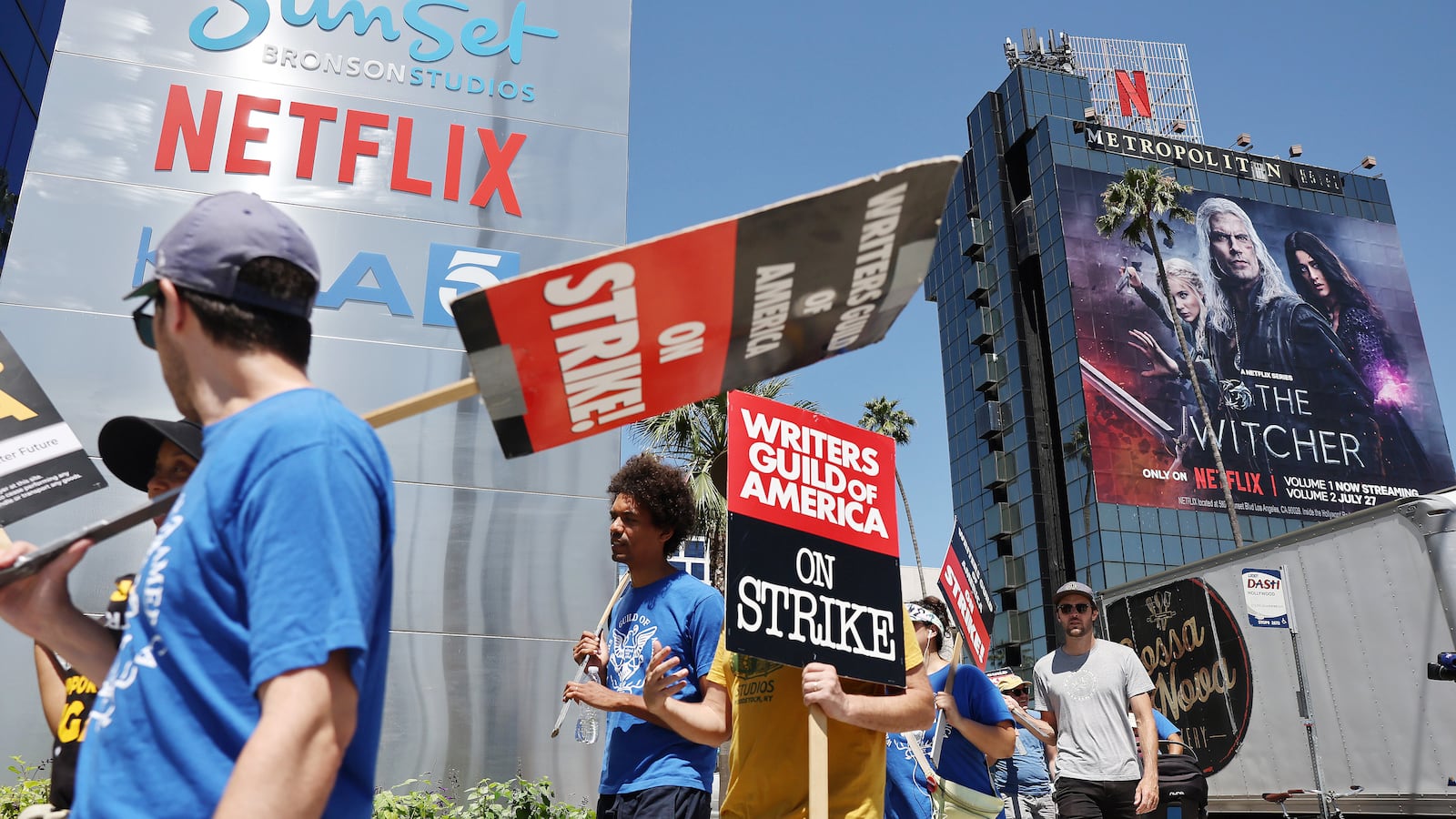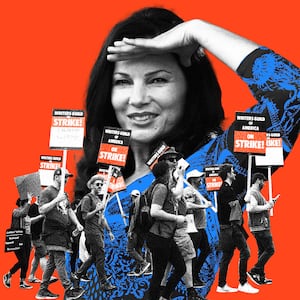Hollywood studio executives are rattling their sabres as negotiations with the actors union, SAG-AFTRA, near their deadline. Their latest tactic? According to a new report from Deadline, they’re threatening to starve striking workers out—and not metaphorically. As one anonymous exec told the trade publication, “The endgame is to allow things to drag on until union members start losing their apartments and losing their houses.”
Wednesday marks a strange day for the entertainment industry. Emmy nominations were announced in the morning, while the actors union’s negotiation deadline looms later in the evening, which could trigger a strike.
Last month, 97.91 percent of 65,000 SAG-AFTRA members who cast a ballot voted to approve a walkout. At a recent meeting, the union briefed publicists on strike rules, which will bar actors from both acting and promotional work—be that through press junkets, premieres, fan conventions, or social media.
Should actors choose to strike, they’d join Hollywood’s writers, who have been striking since May. The two unions share a number of common goals, including equitable compensation for their work and stronger protections against AI. As Adam Conover put it during a viral CNN interview, Warner Bros. Discovery head David Zaslav took home $250 million last year—which is “about the same level as what 10,000 writers are asking him to pay us collectively.” Last month, more than 400 actors signed a letter to SAG-AFTRA pushing the union to settle for nothing less than a “transformative deal.”
So far, the WGA and their allies in other unions like the Teamsters and IATSE have managed to shut down most American productions—barring a few, including from Ryan Murphy. Should SAG-AFTRA go on strike, it wouldn’t take long for the rest to follow suit.
Now, Deadline reports that producers “are planning to dig in hard this fall before even entertaining the idea of more talks with the WGA.” The maneuver has reportedly been in the works for months, and one of Deadline’s sources called it “a cruel but necessary evil.”
On Wednesday afternoon, after Deadline’s story had gone viral on Twitter, a representative from the AMPTP told Deadline, “These anonymous people are not speaking on behalf of the AMPTP or member companies, who are committed to reaching a deal and getting our industry back to work.”
In May, Steven Ross, professor of history at the University of Southern California and author of Working-Class Hollywood, told The Daily Beast that a SAG-AFTRA walkout would “change the complexion” of the WGA strike. With actors still on board, he said, “the studios can make any movie that they have a script for, that they will not change… But what if those actors say, ‘No, we’re not going to show up’? Then everything shuts down.”
Perhaps that’s why the Alliance of Motion Picture and Television Producers (AMPTP), which represents Hollywood’s major studios, has requested federal mediation to help avoid a strike, according to Variety. Major talent agents also reportedly reached out to SAG-AFTRA leadership with the same purpose. The actors union said in a statement posted Tuesday that it had agreed to the “last-minute request.”
“We are committed to the negotiating process and will explore and exhaust every possible opportunity to make a deal, however we are not confident that the employers have any intention of bargaining toward an agreement,” the union added.
Meanwhile, sources tell Variety that AMPTP representatives and studio bosses feel “that a militant minority in the union is having outsize influence on the negotiating strategy, with no regard to the heavy toll that a strike would take on actors as well as other unions and myriad businesses that bank on production-related work.”
It bears repeating: 97.91 percent of SAG-AFTRA’s voting members chose to authorize a strike this summer, and when they did so, they echoed the sentiments already expressed by their leadership.
When the union announced its vote, its president, Fran Drescher, pointed out that both its negotiating committee and National Board had already unanimously agreed in favor. At the time, Steven Ross, the Hollywood labor historian, told The Daily Beast that it was not typical to see all three layers of SAG-AFTRA vote in favor. Sometimes, he noted, “you have a split between the National Board and the membership.”
Evidently, not this time. Speaking with Variety, SAG-AFTRA members said they were preparing for a potential walkout. “It’s just harder to work in this industry and live in an expensive city like L.A.,” SAG-AFTRA member Ryan Faja told the trade.
“... It’s getting harder because people at the top just want more for themselves.”









